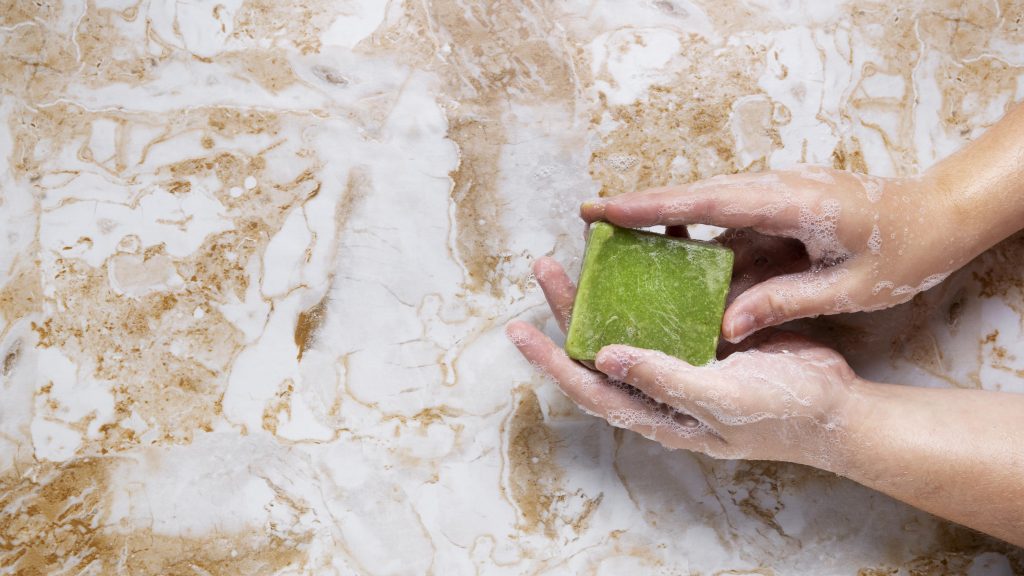Common Causes of Skin Damage
In the modern world, people are become more aware of environmental issues, skin care, and their own health. Making the move to organic soap is one of the easiest yet most significant adjustments you can make. Organic soap is made from natural ingredients like (coconut oil, olive oil, almond oil, alo vera). This soap is good for the environment and your skin, in contrast to conventional soaps that are loaded with artificial chemicals.
What is organic soap?
Organic soap is made with Plant-based oils, essential oils, herbs, and other naturally occurring materials are examples of natural, organic ingredients used to make organic soap. It stays away from harsh chemicals, unnatural colors, and artificial smells. A lot of handcrafted organic soaps are meticulously produced to guarantee the best quality
Top Benefits of organic soap
Kind to Your Skin:
The fact that organic soap is mild and suitable for all skin types is one of its main benefits. Organic soaps include nutritious elements like the following, in contrast to commercial soaps that frequently contain chemicals that deplete your skin of natural oil:
Shea butter: It is well-known for its ability to moisturize.
Coconut oil: Aids in skin hydration and relaxation.
Alo vera: Promotes healing and soothes inflammation.
These organic components guarantee that your skin remains healthy, supple, and free from irritation.
Devoid of Dangerous Substances
Over time, harsh compounds like parabens, sulfates, and artificial perfumes found in many commercial soaps can harm your skin. With organic soap, however:
It is devoid of dangerous poisons.
Makes use of organic preservatives like vitamin E.
Stays away from synthetic ingredients and colors.
For people with allergies, eczema, or sensitive skin, organic soap is therefore a safer option.
Packed with Nutrients
Your skin is nourished by the abundance of nutrients found in organic soaps. Olive oil, almond oil, and essential oils are among the ingredients that are abundant in:
Vitamins A, C, and E: Encourage the regeneration and repair of skin.
Antioxidants: Assist in combating free radicals and delaying aging symptoms.
Unlike traditional soaps, these nutrients are not removed during manufacture.
Eco-Friendly
Making the switch to organic soap is a terrific way to lessen your influence on the environment. This is the reason:
Biodegradable Components: Organic soaps decompose spontaneously without contaminating water supplies or endangering marine life.
Sustainable Production: A lot of companies that create organic soap acquire their components sustainably and using eco-friendly methods.
Minimal Packaging: A lot of organic soaps are packaged in compostable or recyclable materials.
You’re taking a tiny but important step toward a cleaner, greener world by using organic soap.
Maintains Hydration in Your Skin
The capacity of organic soap to hold onto glycerin is one of its distinctive qualities. A natural by-product of the soap-making process, glycerin works wonders as a moisturizer. Glycerin is frequently extracted from traditional soaps to make lotions and other items. Because organic soaps preserve this glycerin, your skin stays hydrated and doesn’t feel tight or dry.
Adaptable to Various Skin Needs
There is an organic soap for every type of skin, including those with dry, oily, sensitive, or acne-prone skin. Numerous companies sell soaps designed to address particular skin issues, like:
Charcoal soap: Perfect for skin that is prone to oiliness and acne.
Goat milk soap: It is ideal for dry and sensitive skin.
Lavender soap: Renowned for its ability to soothe.
You can select a soap that suits your particular requirements thanks to this diversity.
Safe for Pregnant Mothers and Babies
Pregnant women and infants may experience severe reactions to the chemicals in commercial soaps due to their extremely sensitive skin. For their sensitive skin, organic soap offers a safe and natural substitute. Everyone in the family can use it because of its mild formulation and absence of artificial ingredients.
Ethical and free from cruelty
A lot of organic soaps are produced by companies that place a high value on moral behavior. They
Steer clear of animal testing.
Make use of vegan ingredients.
Encourage equitable trade policies.
Purchasing soap frequently helps small companies and craftspeople who are passionate about ethics and quality.
Aromatic Natural Fragrances
Natural essential oils like coconut oil, almond oil, or olive oil give organic soap its aroma. These oils offer advantages in aromatherapy in addition to their lovely scent:
COCONUT OIL:
Hydration: It is great for dry and flaky skin since it retains moisture.
Healing Properties: Promotes wound healing by having antibacterial and anti-inflammatory qualities.
Anti-Aging: Packed with antioxidants, it slows down the aging process of the skin and helps combat free radicals.
Digestive Health: When taken, it facilitates digestion and increases metabolism.
OLIVE OIL:
Skin Moisturizer: Delivers enduring hydration by penetrating deeply into the skin.
Packed with Antioxidants: Packed with vitamins A and E, it shields the skin from damage caused by free radicals.
Heart Health: By lowering cholesterol levels when ingested, it supports cardiovascular health.
Anti-Inflammatory: Reduces skin irritation or inflammation.
Natural Cleanser: Works well as a skin cleanser and makeup removal.
ALMOND OIL:
Nourishes Skin: Rich in vitamins E and D, it encourages skin that is smooth and radiant.
Enhances Complexion: Aids in the reduction of scars, blemishes, and dark circles.
Decreases Inflammation: Calms inflamed or sensitive skin.
Organic soap frequently lasts longer and produces greater outcomes than commercial soap, while initially being more expensive. Because of its superior ingredients, you need less product for each usage, which eventually makes it a more affordable choice.
How to Choose the Right organic soap
The following advice will help you choose the ideal organic soap for your requirements:
Examine the components: Seek out plant-based products, butters, and natural oils. Stay away from soaps with lengthy, difficult-to-pronounce chemical names.
Examine reviews: Check out what people are saying about the product.
Take Your Skin Type Into Account: Select a soap made to address the particular issues with your skin.
Check for Certifications: Reputable products are indicated by certifications such as USDA Organic, Eco Cert, or cruelty-free labeling
What Makes organic soap Better?
There are more benefits to switching to soap than just better skin. It is a way of living that:
Puts your health first.
Encourages eco-friendly methods.
Makes the environment cleaner.
You’re making a tiny step toward a greener earth and a healthier you each time you use organic soap.
Concluding remarks
For anyone wishing to enhance their skincare regimen, organic soap is an easy, efficient, and environmentally friendly option. From nourishing your skin to lessening your environmental impact, it has several advantages. Finding an organic soap that meets your requirements and tastes is simple with so many variations available.
Why wait, then? Make the switch to organic soap today and experience the difference for yourself! Your skin—and the planet—will thank you. If you want to buy organic soap for your skin click here


